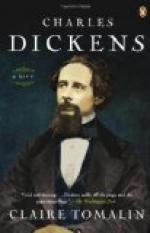of Niagara is noticeably fine, the sublimity of the
subject being remembered, as a piece of impassioned
prose. Whether satire so bitter and unfriendly
as that in which he indulged, both here and in “Martin
Chuzzlewit,” was justifiable from what may be
called an international point of view, is another
question. Publicists do not always remember that
a cut which would smart for a moment, and then be forgotten,
if aimed at a countryman, rankles and festers if administered
to a foreigner. And if this be true as regards
the English publicist’s comment on the foreigner
who does not understand our language, it is, of course,
true with tenfold force as regards the foreigner whose
language is our own.
He understands only too
well the jibe and the sneer, and the tone of superiority,
more offensive perhaps than either. Looked at
in this way, it can, I think, but be accounted a misfortune
that the most popular of English writers penned two
books containing so much calculated to wound American
feeling, as the “Notes” and “Martin
Chuzzlewit.” Nor are signs entirely wanting
that, as the years went by, the mind of Dickens himself
was haunted by some such suspicion. A quarter
of a century later, he visited the United States a
second time; and speaking at a public dinner given
in his honour by the journalists of New York, he took
occasion to comment on the enormous strides which
the country had made in the interval, and then said,
“Nor am I, believe me, so arrogant as to suppose
that in five and twenty years there have been no changes
in me, and that I had nothing to learn, and no extreme
impressions to correct when I was here first.”
And he added that, in all future editions of the two
books just named, he would cause to be recorded, that,
“wherever he had been, in the smallest place
equally with the largest, he had been received with
unsurpassable politeness, delicacy, sweet temper,
hospitality, consideration, and with unsurpassable
respect for the privacy daily enforced upon him by
the nature of his avocation there” (as a public
reader), “and the state of his health.”
And now, with three observations, I will conclude
what I have to say about the visit to America in 1842.
The first is that the “Notes” are entirely
void of all vulgarity of reference to the private life
of the notable Americans whom Dickens had met.
He seems to have known, more or less intimately, the
chief writers of the time—Washington Irving,
Channing, Dana, Bryant, Longfellow, Bancroft; but his
intercourse with them he held sacred, and he made
no literary capital out of it. Secondly, it is
pleasant to note that there was, so far, no great
“incompatibility of temper” between him
and his wife. He speaks of her enthusiastically,
in his correspondence, as a “most admirable
traveller,” and expatiates on the good temper
and equanimity with which she had borne the fatigues
and jars of a most trying journey. And the third
point to which I will call attention is the thoroughly




